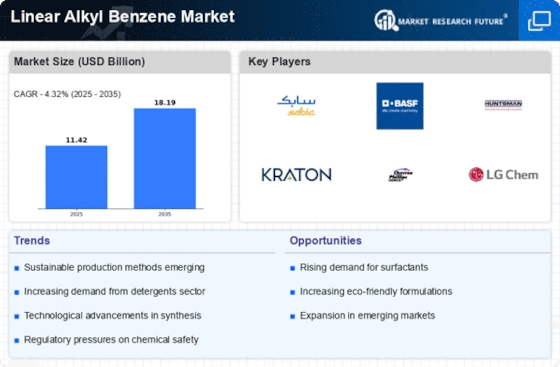Top Industry Leaders in the Linear Alkyl Benzene Market

Linear Alkyl Benzene Market
Linear Alkyl Benzene (LAB), a crucial surfactant, finds its way into diverse applications, from household detergents to industrial lubricants. Navigating the dynamics of this market requires understanding the complex interplay between established players, emerging trends, and evolving consumer preferences. Let's dive into the competitive landscape, exploring strategies, market share influencers, industry news, and recent developments:
Market Landscape and Strategies:
-
Market Domination: Established players like ExxonMobil, Shell, Chevron Phillips Chemical, and BASF hold significant market shares, leveraging economies of scale and brand recognition. Their strategies involve vertical integration, operational efficiency enhancements, and long-term supply contracts. -
Regional Focus: Emerging economies in Asia-Pacific, particularly China and India, exhibit booming demand for LAB due to the burgeoning middle class and rising disposable incomes. Players like China National Petroleum Corporation (CNPC) and Reliance Industries are capitalizing on this, expanding production capacities in the region. -
Innovation: Sustainability concerns are pushing manufacturers towards bio-based LAB alternatives made from renewable resources like coconut oil. Companies like Stepan Company and Kao Corporation are actively investing in bio-LAB technologies to gain a competitive edge and cater to environmentally conscious consumers. -
Diversification: Some players are exploring new application areas for LAB beyond traditional ones. For instance, utilizing LAB derivatives in personal care products, agrochemicals, and oilfield applications opens up untapped growth potential.
Factors Influencing Market Share:
-
Production Capacity and Cost: Access to raw materials, plant efficiency, and cost-effective production processes significantly impact a player's competitiveness. Large-scale producers enjoy cost advantages, while smaller companies may focus on niche markets or differentiated products. -
Technological Prowess: Continuous innovation in LAB production, particularly bio-based alternatives and eco-friendly processes, can attract new customers and secure market share. Companies with strong R&D capabilities hold an edge. -
Regulatory Environment: Stringent environmental regulations in Europe and North America favor bio-based LAB and restrict traditional LAB production. Adapting to these regulations is crucial for market share retention. -
Distribution Network and Customer Relationships: Robust distribution networks and strong relationships with key customers in diverse industries enhance market reach and brand loyalty.
Key Players
- Sasol Ltd. (South Africa)
- Clariant AG (Switzerland)
- Hansa Group AG (Germany)
- Croda International Plc (UK)
- Honeywell International Inc (U.S.)
- Desmet Ballestra Group N.V (Belgium)
- Indian Oil Corporation Ltd (India)
- Reliance Industries Limited. (India)
- Deten Quimica S.A. (Brazil)
- Huntsman International LLC (U.S.)
- Chevron Phillips Chemical Company (U.S.)
- PetroChina Company Limited (China)
- ISU CHEMICAL. (South Korea)
- Jingtung Petrochemical Corp.
- Fushun Petrochemicals
- Unggul Indah Cahaya
- Deten Quimica, among others
Recent Developments :
September 2023: Growing awareness of environmental concerns spurs a surge in demand for bio-based LAB across various applications.
October 2023: The International Linear Alkylbenzene Sulfonates (LAS) Association releases a sustainability roadmap for the industry, focusing on reducing environmental footprint.
November 2023: Increasing competition in the Asia-Pacific market leads to price pressure on traditional LAB, while bio-based alternatives see rising prices due to limited supply.
December 2023: The holiday season fuels higher demand for household detergents and cleaning products, temporarily boosting LAB consumption.










